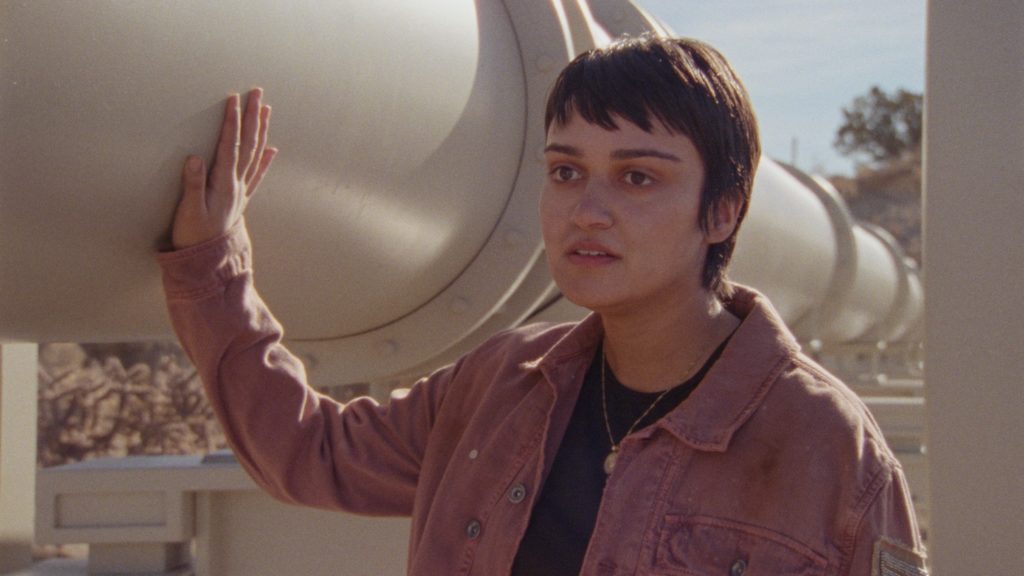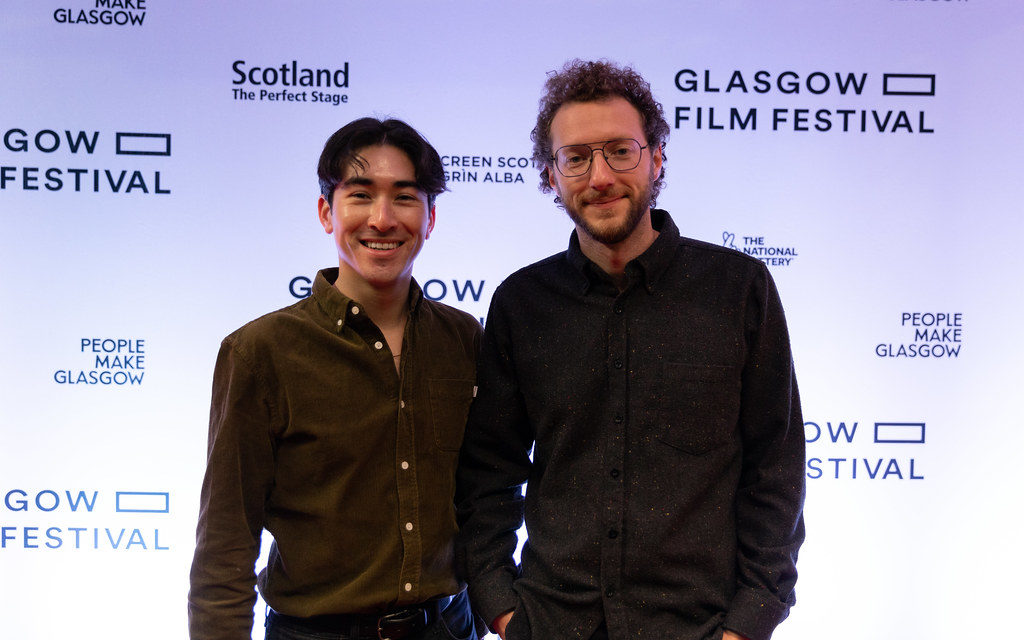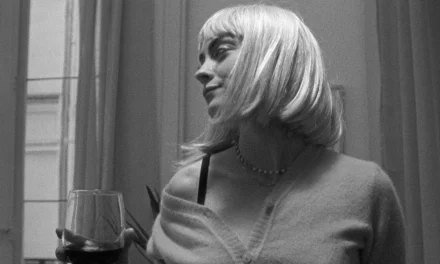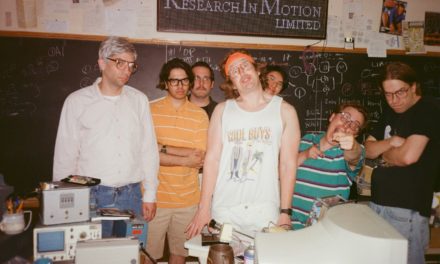I had the privilege to sit down with director Daniel Goldhaber and editor Daniel Garber to discuss their new film, the provocatively titled ‘How To Blow Up A Pipeline’, prior to the UK premiere of the film at this years Glasgow Film Festival. The film is an adaptation of Andreas Malm’s non-fiction book, a book which calls for ecological sabotage as a means of effective climate action. The film takes the books sentiment and turns it into a pulpy fictional narrative of 8 strangers who band together to blow up an oil pipeline in the West Texas desert. Goldhaber and Garber had just flown in from festivals in both Berlin and Dublin when I sat down with them to discuss the ideas of the film, the price of climate action and the challenge of adapting a purely academic text into a fictional narrative.
How did the project come about for both of you?
Goldhaber: I think the origin is the context of a year of covid lockdown and all of us were feeling pretty politically and professionally and creatively powerless and I think we all wanted to do something that felt meaningful. And Jordan [Sjol] (who adapted the text) is an academic, he’s getting his PhD at Duke right now, he’s finishing up his dissertation and he had always wanted to adapt a work of academic theory into a film and so he’s the one who found the book and recommended it to me and Ariela [Barer] (who stars as well as co-wrote the film) reading. Half way through I had this image of a bunch of kids in the desert struggling with a bomb and there was this kind of immediate sense of tempo and excitement and thrill to the idea, kind of a heist movie. We did a couple months of research figuring out what kind of people would do this, talking to activists. And Ariela put those pieces together into an ensemble of 8 and wrote that opening sequence. We were in conversation with Dan [Garber] not just as an editor of the film but an editor of the ideas and the approach and I think thats a corner stone to how he works and the reasons we love working together.
Garber: The minute Danny mentioned this book to me I immediately went out and bought it and I read it over the corse of like a day. It’s a quick read to begin with but also I was just so engrossed in it, I couldn’t put it down. I was so motivated by the ideas behind it and I think part of it was that I was experiencing all of the same kind of helplessness and fatalism that the book is so good at addressing and I realised that theres so much potential in making a film on this subject so I was really eager to read their pages. So they would send me versions of the script and one of the questions was always, and this continued through the edit, where is the book a better resource than the movie? And what can the movie do uniquely? So I was hoping to sort through those kind of ideas. What needs to be on screen, and what can we trust that people will go out and seek out from other sources, was one of the main criteria.
That leads me on to my next question as the book is a non-fiction call for action against the climate crisis, so I wonder what the process of trying to adapt that into something fictional was. Are you trying to add something to this discourse or communicate the same ideas?
Goldhaber: I wouldn’t say we were ever thinking about it in those terms. I think that we were thinking about it in the terms of dramatising the ideas. And I think when you dramatise something you change it and you change it in a way that something that is purely theoretical becomes human and so it becomes a little more complicated. But I think that ultimately we all do believe that narratives are reflections of ideas, narratives are ideas structured into stories. And I think that we very much thought the purpose of the film was taking the ideas of the book and we’re adapting and dramatising them into a film, and I think that is something we were alway upfront with Andreas about.
Garber: Yeah and I think that the other part is that it’s not just about the ideas, it’s also about the emotions. Like the emotional realities of anyone who trying to engage in this kind of action or anyone who isn’t but cares about climate change, thats all part of the discourse that needs to occur as well. Why would somebody do this? Well, its kind of hard to simply explain that in a totally rational way, it never quite adds up. But the more that you can create a story that involves people emotionally the more that you can create that understanding [of] why these ideas might have certain currency with some individuals.

It definitely makes you think in those terms, it humanises it. That’s what I was trying to get at, it never feels like an adaptation of a non-fiction text. It feels like a story that is about these people that just so happens to also be about the climate crisis. It sort of took me by surprise. It’s still very much about climate action but you’re able to wrap it up in this nice genre fiction you’re making. In terms of that, what was some of the inspiration film wise. Because, as you were saying, it sort of plays out like a heist film.
Goldhaber: In terms of the inspiration for that approach I think thats also just through collaborating with Ariela and Jordan and Dan for many years in different configurations. I think that this is just all the kind of art and kind of stories we’re interested in telling, stuff thats predicated on avant-garde or radical ideas that can be accessible in the mainstream and that can speak to a broader, more commercial audience. There’s too much of a cultural pressure on the left to make things niche and make things arty, make things obtuse. And I think thats what that does is that it removes those ideas out of mainstream discourse. It says that: this is just for us and nobody else. And I think that politically thats a bit dubious. I think that it’s really really important to try to speak to everybody and have that respect for the broader public. In terms of more specifically the heist films that we were thinking about working on this; Oceans 11 was the first, love that movie. Think it’s on of the best American films ever made, it’s just a perfect film. And I think that was the starting point: ok Oceans 11 for eco-radicalism, what does that look like? But then a lot of other heist movies came in. So obviously there’s explicit homages if not out right theft to Reservoir Dogs. And theres you know Rafifi, Thief, Charley Varrick was a late breaking one that I really loved that I was thinking about a little bit in the shooting, especially because Don Siegel has a bit of a looser documentary-esque style in that film. Did I miss any? Theres so many man. Army Of Shadows, Circle Rouge….
Yeah, it reminded me a lot of the French new wave’s use of genre that allows for the arty or bigger ideas to come through. I’m interested in that because you’re obviously going to have some push back from the initial idea, its probably off putting to some people, but I think if your approaching it from this angle you’re actively trying not to just preach to the converted.
Garber: Something we were always thinking about was ways that we could make it feel as if every idea and every opinion comes from within the characters so it doesn’t feel too much like we as the filmmakers lean one way or another. It doesn’t feel like something that the audience can easily dismiss and just say this is the filmmakers having a field day with whatever ideas, but to see like oh I understand why from this characters perspective one might have that kind of view. I also think that one of the most important characters in the film is Dwayne who’s political beliefs are never fully explicated but I think the idea is that he doesn’t come from the same background as many of the other members of this ensemble. He’s a white guy who is of the land who in many ways would politically disagree with some of the other members and we wanted to create a a view point that allows people who might not totally align with us to say that actually we all have some vested interest in the issue of climate and land usage and there might be reasons to engage in an act of sabotage independent of just bing ideologically left.
“All of us were feeling pretty politically and professionally and creatively powerless and I think we all wanted to do something that felt meaningful”
-Daniel goldhaber
And it’s such a bigger issue that effects everyone, it’s not political. And I think that is the problem with the discourse at the minute, that it is you are either with us or against us. And I’ve just got one more question about this, that being are you aware coming up with the idea you are having to take a stance? Because I think the stance we end up with at the end of the film is that everything has its cost and there is an inherent cost to radical action.
Goldhaber: For us it was less about having to take a stance and more just trying to get clarity. When we started the film I was in a place, I speak for myself not Ariela or Jordan, that I was wanting to make a piece of propaganda, just because I was angry. And it was through that process [of] figuring out what this project would be that it very quickly became clear that that was not interesting and that would kind of just speak to a group of people that already agreed. That what was more interesting and more important would be to make us tell a story that would force people into confronting the central idea that if the existential threat of climate change is the end of life on earth as we know it then what kind of tactics are justified to fight against that? And in asking that question in a narrative form you want to offer different perspectives on it and thats what we do through the ensemble. That’s also what we do through the kind of cost benefit analysis of the end of the film where (spoiler alert!) they do getaway with what they set out to do but at the same time there is an individual and an implied social cost to that action. And that is the fundamental complication of sabotage, property destruction and broader social disruption as an activist tactic. And something else that both the movie and the book can acknowledge is that without that is there actually a possibility for change? We wanted to tell a story that allowed anybody to come out of the film thinking about that, not having a conclusion about it but thinking about it because ultimately if you try to push a conclusion on somebody you narrow your ability to communicate. Where as if you ask a question really really effectively then people come to that from where they are not from where you want them to be. And it took literally until after the movie was already at TIFF to actually nail the ending, like really get it to the place where we were hopefully doing that.
Garber: I think that the ending is actually such a great case here. Because there were versions of the ending where we were trying to anticipate the actual effects of this action might be in terms of gas prices, backlash from right wing militia, all sorts of other questions about what would be the realistic outcomes of an action like this in the real world. And I think that we felt that we couldn’t satisfyingly deliver on the entire chain of events that this would set off. We were much more equipped to talk about whether this is a justified act in light of the struggle that we are currently in.
Goldhaber: And of these 8 individual characters…
Garber: Right. Right. And thats totally outside the purview of the film but its something that people can talk about when they come out into the world and I think thats part of what needs to be grappled with is: what would be the effects of this? And in itself is this a justifiable act? And I hope that we’ve given people enough tools to think through that themselves.





